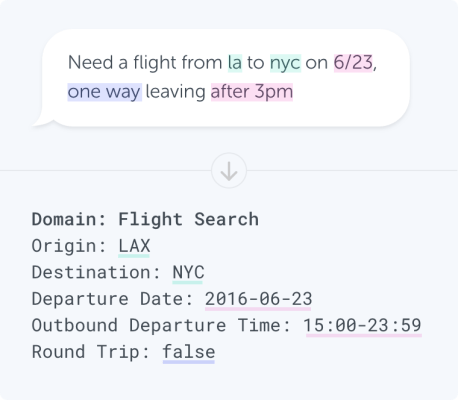GoButler, the startup that originally offered a virtual assistant that let you request anything on-demand, appears to be pivoting for a second (and maybe final) time. The New York-headquartered company is shuttering the GoButler consumer-facing service altogether in favour of offering natural language processing technology to third-parties.
Angel.ai is based on the same NLP technology that previously powered GoButler’s “fully-automated” flight search and discovery, and will enable commerce companies to build ‘conversational’ user interfaces, such as Facebook Messenger chat bots, or other kinds of natural language search.
However, instead of targeting a single vertical, Angel.ai claims to be able to process conversational requests across 40-plus commercial domains out of the box, providing businesses with an off-the-shelf solution to facilitate natural language-powered transactions.
The idea is to let consumers express intent in a more natural way, and by translating natural language expressions into structured, actionable requests, commerce companies can capture that intent and make their products easier to find and purchase.
“The objective with GoButler as a product was to figure out how people interact through conversational commerce, gathering millions of examples of how people express intent in a natural language message. From there, we used our human-assisted concierge to develop our AI and help train our models, aggregating the data from conversations to build out our data set,” Navid Hadzaad, CEO and co-founder of Angel.ai, tells TechCrunch.
“Ultimately, this has led us to our current B2B technology product, Angel.ai, that will focus on developing natural language search for commerce. On day one, it would have been impossible to claim what the solution of the problem we are working on would look like.”
The point that Hadzaad repeatedly makes is that without the conversation data the original messaging-based but human-powered GoButler captured, it would have been impossible to develop the Angel.ai tech. Natural language processing is entirely reliant on the data set it’s trained on and it’s this data set, specifically related to commerce intent, where he believes the startup has an advantage.
That said, I can’t help tease that this is the second pivot sanctioned by Hadzaad and that perhaps investors are getting tired of the change in strategy; a B2B company can look a lot less sexy from the outside than one that consumers directly interact with.
“I know you could call it a pivot if you want to, although we’re really still working on the same problem — offering consumers the most efficient way to express an intent and ultimately make a transaction,” he says, kicking back a little.
“The number-one thing shareholders are concerned with is that a company takes the best available path to success. When you’re a startup shaping a new space, it would be foolish to assume that your day one hypothesis will never change. I truly believe that as a startup you need to leverage the flexibility you have, learn quickly and move on”.
And move on the once Berlin-based company has. Separately, I’m hearing that Angel.ai has already struck deals with several companies in the travel and delivery space who will be launching new products over the next few months, although Hadzaad declined to comment on who or what they are. My understanding is that these won’t necessarily be messenger app integrations per se, but that Angel.ai’s tech could also surface in the form of a search box on a commerce company’s website or a chat box within their existing app.
“Our unique combination of AI scientists and product/business experts allows us to not act as a research lab, but as an AI company developing real products,” adds Hadzaad. “The fact that we have domain-specific models that are trained on millions of examples of consumers expressing specific domain intent in a message, differentiates us from other businesses in the space”.
